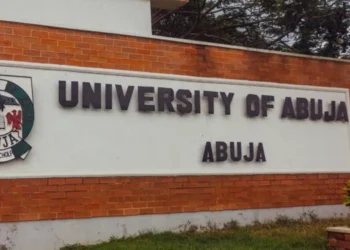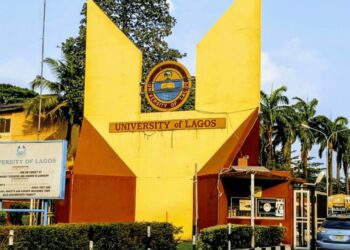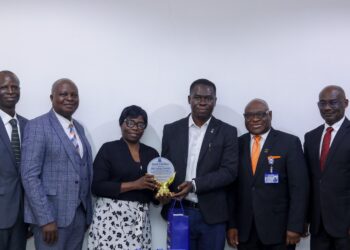A former Minister of Health and 11th Vice Chancellor of the University of Ibadan, Professor Isaac Adewole has stated that the challenge of leadership emergence in Nigerian higher education institutions is emblematic of broader governance issues in the country.
The don and medical professional ,who flagged Ethnicity , Regional and Political Considerations as major snags of the process, made the submission while delivering the 14th Registry Annual lecture of the Federal University of Technology Akure, FUTA on the 24th July 2025. Professor Adewole who spoke on, “ Conundrum of Leadership Emergence in Nigerian Higher Education Institutions : The Missing Links,” however said ‘with structural reforms, capacity building, and a renewed commitment to meritocracy and transparency, it is possible to cultivate visionary and transformative leadership capable of revitalizing Nigeria’s academic landscape.”
Professor Adewole said one of the key challenges of the process is political considerations which he says often take precedence over merit when appointing key academic and administrative leaders. According to him , “Patronage, favouratism and external pressures can weaken the integrity of the selection process, sometimes leading to the promotion of leaders who lack the necessary skills or vision.” Adewole also flagged ethnic and regional considerations as part of the problems assailing the choice of credible leadership for the country’s many higher institutions. Said he, “Nigeria’s rich ethnic diversity, while a source of cultural strength, can also manifest as intense competition and factionalism within institutions. Leadership struggles may be influenced by regional loyalties, thereby impeding unity and collaboration with universities and polytechnics.”
The Guest lecturer also said most institutions of higher learning lack leadership development programmes. To him, “Few Nigerian HEis have strong leadership development or succession planning programs in place. As a result, leadership emergence is often informal, reactive, or based on mentorship rather than systematic training and grooming.”
To enhance the emergence and effectiveness of leaders in Nigerian higher education, Professor Adewole suggested a multifaceted approach institutionalizing transparent, merit-based selection. He recommended that, “The Governing Council should carefully review the appointment of Vice-Chancellors and other key officials. This role requires creativity, energy and fact. In all these areas, adopting a new approach is crucial. The time between the appointment and the beginning of duties should dedicated to orientation and training, helping the new Vice Chancellor perform effectively in a role they may not yet be fully prepared for. This period should also focus on developing a strategic plan with clear, measurable objectives. The Committee of Vice-Chancellors (CVC) and the Association of Vice Chancellors of Nigeria (AVCNU), under the guidance of the National Universities Commission (NUC), should oversee the process. The goal is to prepare the new VC for success in their position, otherwise, they may become dependent on specialists.”
He also said , “outgoing Vice-Chancellors should be protected from the process to ensure fairness. The current Registrar, as the Council’s Secretary, should act as an impartial referee and provide unbiased advice to the council as a whole, especially to the Pro-Chancellor. They should serve as council’s memory, maintaining records of past activities and alerting the council to potential risks.”
Professor Adewole pointed out that “There is a need for a new charter with a clear call for redefining the roles of universities within the Nigerian context. The issue of autonomy must be considered, as there are no privileges without responsibilities. Universities are renowned for their commitment to academic freedom and intellectual creativity. These values have been eroded over the years with little or no opposition from the increasingly passive Nigerian University System”.
He said “The loss of autonomy has been gradual but steady. This is evident in the politicization of governing councils, the reduction in funding, and the introduction of the “envelope” system. Other issues include the centralization of admissions, centralized negotiations, and uniform salary scales that do not account for workload and specialization, as well as the intrusion of religious considerations”.
In conclusion Professor Adewole said” the conundrum of leadership in Nigerian University Systems reflects broader systemic dysfunctions at its core lies the missing link: the absence of coherent , merit-based and future oriented framework for leadership development and selection.” He said addressing the gap is not only urgent but also essential for revitalizing Nigeria’s higher education systems . He suggested that “Through reforms that promote meritocracy, autonomy and strategic planning Nigeria can begin to produce leaders who are not only academically competent but internationally transformative. By adopting transparent procedures, promoting inclusively, and investing in leadership training. Nigerian HEis can become models of excellence and innovation, not just in Africa but worldwide. The journey toward transformative leadership continues, and its benefits- for individuals, institutions and society – are invaluable.”
The Registrar and chief host , Mr. Charles Adeleye while speaking earlier said “this year’s lecture is critical to the ongoing discourse around higher education reforms leadership and institutional governance. The registry annual lecture has become a significant intellectual and professional tradition in the university, providing the platform for reflection, discourse, continuous development of the Registry and administrative best practices within our institutions”.
On her part the Vice Chancellor Professor Adenike Oladiji commended the Registrar and the staff of the Registry for sustaining the tradition against all odds. She said ” this occasion marks yet another milestone in the intellectual and administrative tradition of our great institution: a tradition of reflective engagement on the challenges and transformational possibilities in the governance of higher education in Nigeria. The theme of this year’s lecture compels us to interrogate not just the nature of leadership in our universities but also the processes and principles that inform its emergence”. She said ” FUTA as a university remains committed to building a culture of principled leadership, rooted in integrity, professionalism and academic excellence . The Registry in particular remains central to this transformation as it anchors the administrative life of the university and ensures that due process is kept in focus in the scheme of things “.
The Chairman of the Local Organising Committee, Mr. Isaac Fafila in his remark described the occasion as pivotal to the growth of the Registry of higher institutions in the Nigerian education system saying the calibre of past guest lecturers and Professor Adewole has made the FUTA Registry Annual Lecture a flagship of idea generation for the development of Registry and Higher Education Institutions in Nigeria.
At the occasion Dr. Matthew Odunlade Ayoola, a one-time Registrar of the Federal University of Agriculture Abeokuta and Mr. Felix Adetula , pioneer Registrar of Federal Polytechnic Ile Oluji were honoured with the Award of Worthy Ambassadors of FUTA Registry. The Chairman of Ondo State Universal Basic Education Board, Rt. Hon. Victor Olabimtan got the FUTA Registry Award of Excellence in Public Education Administration , while the Chairman of a Wire and Cable Company Engr. Emmanuel Ojo Adewunmi got the FUTA Registry Award of Excellence in Entrepreneurship.


















































































 EduTimes Africa, a product of Education Times Africa, is a magazine publication that aims to lend its support to close the yawning gap in Africa's educational development.
EduTimes Africa, a product of Education Times Africa, is a magazine publication that aims to lend its support to close the yawning gap in Africa's educational development.